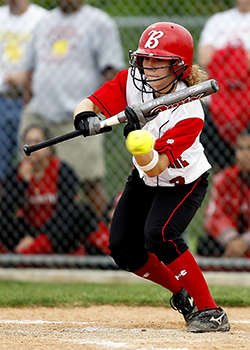How to Play Safely on the Field


Wear Proper Protective Gear
Protective gear is “anything you wear that helps keep you from getting hurt.” Most sports will have safety equipment designed specifically with that activity in mind. For example, mouth guards worn during football, wrestling or hockey can protect your mouth, teeth, and tongue. Protective gear is a key factor to avoiding injuries and should be worn at all times.
Just as important as having the correct protective gear is ensuring that it is the correct size, fits well, and is in acceptable condition. Always check that your gear doesn’t have broken straps or isn’t missing important components like buckles. Keep an eye out to make sure padding isn’t worn down to the point that it no longer creates an effective barrier against impact or that you aren’t wearing worn-out shoes which creates an opportunity for injuries such Achilles’ Tendonitis and knee pain.
Warm Up and Stretch
You should always make sure you spend a few minutes before every practice and game warming up and stretching. The reason for warming up is to correctly prepare your muscles, tendons, ligaments, joints, and heart for the exercise they are about to get. Warming up will also gradually increase your heart rate and circulation to prepare your body for the activity that lies ahead. Start out by doing some light exercise such as running in place or doing jumping jacks.
Next spend some time stretching to help release muscle tension and increase flexibility. Stretching also helps to avoid injuries such as muscle tears or sprains. According to exercise physiologist and fitness consultant Elizabeth Quinn, “In addition to improving range of motion, stretching is extremely relaxing and most athletes use stretching exercises to maintain a balance in body mechanics.”
Also remember it is just as important to cool down and stretch again after you are finished playing to help your body recover.
For more information on why warming up and stretching are important as well as some stretching exercises visit www.choc.org and wonderopolos.org
Know the Rules of the Game
Each sport has its own set of rules and regulations. These guidelines are put in place, not as restrictions, but rather to promote safety and help you and your teammates avoid injury. Make sure you learn and truly understand the rules of the game before you step onto the field. In addition, proper technique is also fundamental for staying safe on the field. By knowing what is expect of you, you can ensure that the activity is fair and safe for all participants involved.
Pay Attention to the Weather
Be aware of the temperature when you are playing or practicing outdoors. When it is hot or there is high humidity, take extra caution to stay properly hydrated before, during and after sports activities to avoid heat-related injuries or illness. Being well hydrated keeps your body performing at its best level.
We all know that when your body gets hot, it sweats. When your body starts losing more water than it takes in through sweating, you may become dizzy, experience muscle cramping, fatigue or put yourself at risk for dehydration, heat exhaustion or even heatstroke. To prevent this, you should always make sure to take water breaks to cool the body and prevent it from overheating.
For more information on the importance of good hydration visit familydoctor.org
Ultimately, while taking part in sports can be fun, you should be aware of the dangers that can be a part of any competitive physical activity. Following important safety precautions helps reduce that chance of injury. Exercising caution can keep you out on the field enjoying the sports you love and not just sitting on the sidelines recovering.
-----
For a printable sports safety sheet with more tips on how to stay active, healthy and injury free please visit: safekids.org
For additional reading on the topic of how to play safely on the field please visit: rd.com and nytimes.com
By Julie Flanagan







